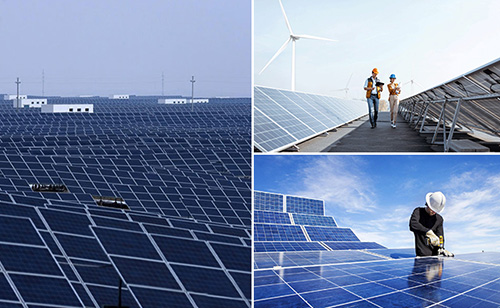EPC Solutions
As a representative of clean energy, solar photovoltaic systems are increasingly receiving widespread attention and application. EPC stands for Engineering, Procurement, and Construction. It refers to a particular form of contracting arrangement used in various industries, including construction, power generation, and oil & gas. Entersolar is a supplier focusing on the design and production of solar series products with rich R&D experience. Here is an overview of EPC projects and a comprehensive analysis of the engineering, procurement, and construction of solar photovoltaic systems on Entersolar.com.
1. Engineering: This phase includes the design and planning of the project. Engineers create detailed blueprints, models, and plans to ensure the project meets the required specifications and standards.
2. Procurement: This phase involves the acquisition of all the necessary materials, equipment, and services required for the project. The procurement team sources these items such as solar power inverter, solar panels for house from various suppliers, ensuring they meet quality and budgetary requirements.
3. Construction: This phase encompasses the actual building and assembly of the project. Construction teams work according to the engineering plans, using the procured materials and equipment to complete the project.

2. Single point of responsibility: The EPC contractor is responsible for the entire project, from design through construction. This simplifies project management and reduces the risk for the project owner.
3. Fixed-price contracts: EPC contracts are typically fixed-price, meaning the contractor agrees to complete the project for a predetermined price. This helps the project owner manage costs and avoid budget overruns.
4. Schedule certainty: EPC projects usually have a fixed schedule, with the contractor committing to complete the project within a specified timeframe. This ensures timely project delivery.
2. Risk management: The project owner transfers a significant portion of the project risk to the EPC contractor, reducing their own exposure.
3. Cost control: Fixed-price contracts provide cost certainty, helping project owners manage their budgets effectively.
1. Power generation: Construction of power plants, including renewable energy projects such as solar and wind farms.
2. Oil & Gas: Development of oil refineries, gas processing plants, and pipelines.
3. Infrastructure: Construction of roads, bridges, and other public infrastructure projects.
4. Industrial facilities: Building factories, manufacturing plants, and other industrial facilities.
What is an EPC project
An EPC project involves three main phases:1. Engineering: This phase includes the design and planning of the project. Engineers create detailed blueprints, models, and plans to ensure the project meets the required specifications and standards.
2. Procurement: This phase involves the acquisition of all the necessary materials, equipment, and services required for the project. The procurement team sources these items such as solar power inverter, solar panels for house from various suppliers, ensuring they meet quality and budgetary requirements.
3. Construction: This phase encompasses the actual building and assembly of the project. Construction teams work according to the engineering plans, using the procured materials and equipment to complete the project.

Key features of EPC projects
1. Turnkey solutions: EPC contractors provide a turnkey solution, meaning the project is delivered ready for use, with all systems fully operational.2. Single point of responsibility: The EPC contractor is responsible for the entire project, from design through construction. This simplifies project management and reduces the risk for the project owner.
3. Fixed-price contracts: EPC contracts are typically fixed-price, meaning the contractor agrees to complete the project for a predetermined price. This helps the project owner manage costs and avoid budget overruns.
4. Schedule certainty: EPC projects usually have a fixed schedule, with the contractor committing to complete the project within a specified timeframe. This ensures timely project delivery.
Benefits of EPC projects
1. Efficiency: With a single contractor handling all phases of the project, EPC projects can be more efficient and streamlined.2. Risk management: The project owner transfers a significant portion of the project risk to the EPC contractor, reducing their own exposure.
3. Cost control: Fixed-price contracts provide cost certainty, helping project owners manage their budgets effectively.
Applications of EPC projects
EPC projects are commonly used in various industries, including:1. Power generation: Construction of power plants, including renewable energy projects such as solar and wind farms.
2. Oil & Gas: Development of oil refineries, gas processing plants, and pipelines.
3. Infrastructure: Construction of roads, bridges, and other public infrastructure projects.
4. Industrial facilities: Building factories, manufacturing plants, and other industrial facilities.
